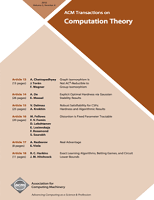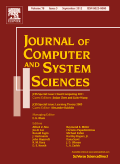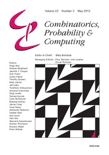
COMPUTATIONAL COMPLEXITY
Scope & Guideline
Exploring the Depths of Algorithmic Innovation
Introduction
Aims and Scopes
- Theoretical Foundations of Complexity Classes:
This area explores the foundational aspects of complexity classes such as P, NP, NP-complete, and beyond. It includes studies on the relationships between these classes, as well as their implications for algorithm design and computational limits. - Approximation Algorithms and Hardness:
Research focusing on approximation algorithms investigates the feasibility of finding near-optimal solutions for NP-hard problems. This includes establishing hardness results and developing efficient approximation techniques. - Algebraic Complexity Theory:
This scope examines the complexity of problems from an algebraic perspective, including the study of algebraic branching programs, circuits, and polynomials. This area is crucial for understanding the computational power of algebraic systems. - Communication Complexity:
This area addresses the resources required for communication between computational entities and is essential for understanding distributed computing models. Studies often involve analyzing protocols and their efficiency. - Graph Theory and Combinatorial Structures:
Research in this domain focuses on the complexity of problems related to graph theory, including coloring, matching, and structural properties of graphs. These studies often have implications for both theoretical computer science and practical applications. - Quantum and Randomized Complexity:
This area explores the differences between classical and quantum computation, as well as the role of randomness in algorithms. Research often investigates how these models can solve problems more efficiently than classical approaches.
Trending and Emerging
- Algorithmic Lower Bounds and Complexity Gaps:
There is a growing interest in establishing lower bounds for various computational models, especially in relation to algebraic circuits and branching programs. This trend reflects a deeper inquiry into the limitations of current algorithms and computational frameworks. - Streaming Algorithms and Online Complexity:
Recent studies have increasingly focused on streaming algorithms, which are designed to process data in a single pass. This theme is relevant due to the rise of big data and the need for efficient algorithms that can handle large-scale inputs. - Interplay Between Complexity and Algebra:
There is an emerging focus on the connections between algebraic structures and computational complexity, particularly regarding polynomial identities and algebraic branching programs. This indicates a trend towards exploring foundational mathematical concepts in relation to complexity. - Quantum Complexity and Communication Models:
Research on quantum complexity, especially in conjunction with communication models, has gained prominence. This reflects the growing importance of quantum computing and its implications for traditional complexity theory. - Complexity of Approximation Problems:
An increasing number of papers are dedicated to the complexity of approximation problems, indicating a trend towards understanding how to efficiently approximate solutions to complex computational problems.
Declining or Waning
- Classical Circuit Complexity:
There has been a noticeable decline in papers focusing solely on classical circuit complexity, particularly those that do not integrate newer approaches or connections to other areas of complexity theory. - Basic Complexity Theory without Applications:
There seems to be a waning interest in foundational studies of complexity theory that do not link to practical applications or other domains, suggesting researchers are increasingly looking for interdisciplinary connections. - Deterministic Algorithms for Hard Problems:
The focus on deterministic algorithms for traditionally hard problems appears to be diminishing, as more researchers are exploring randomized and approximation strategies that yield practical results. - Basic Graph Algorithms:
Research centered on basic graph algorithms without deeper complexity implications has seen reduced attention, likely due to the increasing complexity of problems being considered in conjunction with graph theory.
Similar Journals

Algorithms
Elevating Standards in Algorithmic Research and Discussion.Algorithms is a prestigious and innovative journal published by MDPI, focusing on the rapidly evolving fields of computational mathematics, numerical analysis, and theoretical computer science. Launched in 2008, this open access journal seeks to foster collaboration and knowledge sharing among researchers, professionals, and students by providing a platform for the dissemination of high-quality research articles, reviews, and notes. With its operational base in Basel, Switzerland, Algorithms has steadily established itself in the academic community, achieving commendable rankings such as Q2 in Computational Mathematics and Numerical Analysis, as well as Q3 in Computational Theory and Mathematics and Theoretical Computer Science as of 2023. Furthermore, the journal boasts impressive Scopus rankings, placing it within the top 20% in several categories, underscoring its relevance and influence in the field. As an open access journal, Algorithms ensures that its content is accessible to all, promoting the advancement of algorithmic research and fostering critical discussions that may shape the future of the discipline.

JOURNAL OF COMPLEXITY
Transforming Complexity into ClarityJOURNAL OF COMPLEXITY, published by Academic Press Inc. Elsevier Science, is a prestigious academic journal that has been at the forefront of advancements in the field of complexity science since its inception in 1985. With an ISSN of 0885-064X and an E-ISSN of 1090-2708, this journal is recognized for its impactful contributions across a range of mathematical disciplines, evidenced by its Q1 quartile rankings in Algebra and Number Theory, Applied Mathematics, Control and Optimization, Numerical Analysis, Statistics and Probability, and more. Positioned within the top echelons of Scopus rankings, it boasts notable standing—ranking #6 in Algebra and Number Theory and #25 in Numerical Analysis. Researchers, professionals, and students will find the journal's rigorously peer-reviewed articles invaluable for exploring the intricate relationships and phenomena that characterize complex systems. Although not an open-access journal, the insights offered are essential for expanding knowledge in mathematical frameworks and their applications in real-world problems. With a converged publication timeline extending to 2025, the journal is poised to continue shaping the discourse in complexity studies for years to come.

Theory of Computing
Exploring the Depths of Theoretical FrameworksTheory of Computing, published by the University of Chicago, Department of Computer Science, is a prestigious journal that has established itself as a leading platform in the fields of Computational Theory and Theoretical Computer Science. With its ISSN 1557-2862, the journal has earned a reputation for high-quality, peer-reviewed research, positioning itself in the Q1 quartile for both Computational Theory and Mathematics, as well as Theoretical Computer Science as of 2023. Despite its limited open access options, the journal remains a vital resource for researchers and academics, providing insights that push the boundaries of theoretical frameworks and methodologies in computer science. The journal's commitment to rigorous scholarship serves to foster innovation and deepen understanding in a rapidly evolving field, making it an essential reference for professionals, students, and practitioners alike.

ACM Transactions on Computation Theory
Fostering Collaboration in Cutting-edge Computational Research.ACM Transactions on Computation Theory, published by the Association for Computing Machinery, is a prestigious journal dedicated to advancing the field of computation theory and theoretical computer science. With an ISSN of 1942-3454 and an E-ISSN of 1942-3462, this journal serves as a vital resource for researchers and professionals seeking to explore groundbreaking developments in computational models, algorithms, and their mathematical foundations. The journal's rigorous standards have earned it a significant position within the academic community, as evidenced by its 2023 category quartiles, ranking in the Q1 category for Computational Theory and Mathematics and Q2 for Theoretical Computer Science. Although it operates through traditional subscription access, it maintains a critical role in disseminating cutting-edge research and fostering collaboration among experts in the United States and beyond. As an influential platform, ACM Transactions on Computation Theory is committed to contributing to the ongoing dialogue and advancement of computation theory, making it essential reading for anyone passionate about this dynamic field.

Computability-The Journal of the Association CiE
Unveiling New Dimensions in ComputabilityComputability - The Journal of the Association CiE, published by IOS PRESS, is a premier academic journal dedicated to advancing the field of computational theory and its applications. Established in 2012, this journal serves a diverse audience, including researchers, professionals, and students involved in the realms of Artificial Intelligence, Computational Theory and Mathematics, and Theoretical Computer Science. With robust categorization in Q2 and Q3 quartiles for various related fields, it provides a vital platform for innovative research and discussions that shape the landscape of computational technologies. Although it operates under a subscription model, the quality of published content ensures significant academic contributions and offers valuable insights relevant to contemporary scientific challenges. Researchers interested in the intersection of computation and its practical implications will find Computability an essential resource for exploring cutting-edge developments and fostering scholarly exchange.

JOURNAL OF LOGIC AND COMPUTATION
Bridging Disciplines through Logic and ComputationJOURNAL OF LOGIC AND COMPUTATION, published by Oxford University Press, is a leading peer-reviewed journal dedicated to advancing research in the intersections of logic, computation, and theoretical frameworks of computer science. With an ISSN of 0955-792X and an E-ISSN of 1465-363X, the journal has established itself within academic circles, boasting significant impact evidenced by its category quartiles, including a Q1 ranking in Arts and Humanities (miscellaneous) and a Q2 in Logic for 2023. This prestigious journal emphasizes interdisciplinary approaches to understanding computational systems, hence targeting a diverse audience of researchers, professionals, and students keen on exploring provocative questions in logic and computation. Although not open access, the content is highly valuable, reflecting contemporary challenges and advancements in the field. With over three decades of published work, spanning from 1990 to 2024, the journal continues to contribute richly to the discourse surrounding logical methodologies and computational innovations, making it an essential resource for those engaged in these dynamic areas of study.

JOURNAL OF COMPUTER AND SYSTEM SCIENCES
Exploring innovative theories in computer and applied mathematics.The Journal of Computer and System Sciences is a distinguished publication founded in 1967 and continually striving to push the boundaries of knowledge in computer science and applied mathematics. Published by Academic Press Inc, Elsevier Science, this journal boasts impressive credentials, holding a Q1 quartile ranking across multiple categories including Applied Mathematics, Computational Theory and Mathematics, Computer Networks and Communications, and Theoretical Computer Science as of 2023. With a focus on innovative research and comprehensive theoretical developments, this journal serves as a pivotal forum for authors and readers alike, facilitating cutting-edge contributions to the field. The journal is not currently open access, providing a curated selection of high-quality articles for its subscription residents. By engaging with this journal, researchers, professionals, and students can gain insight into the latest trends, prominent methodologies, and significant findings that shape the modern landscape of computing and systems analysis.

DISCRETE MATHEMATICS AND THEORETICAL COMPUTER SCIENCE
Advancing Knowledge at the Intersection of Mathematics and ComputingDISCRETE MATHEMATICS AND THEORETICAL COMPUTER SCIENCE, published by DISCRETE MATHEMATICS THEORETICAL COMPUTER SCIENCE in France, stands as a significant open-access journal since 1997, publishing innovative research articles within the intersecting disciplines of discrete mathematics and theoretical computer science. With an ISSN of 1462-7264 and an E-ISSN of 1365-8050, this journal aims to provide a platform for scholarly discourse and dissemination of knowledge, making it accessible to a global audience. It is recognized for its contributions, achieving a Q2 ranking in both Computer Science (Miscellaneous) and Discrete Mathematics and Combinatorics, alongside a Q3 ranking in Theoretical Computer Science as of 2023. The journal’s rigorous selection process ensures that only high-quality research is published, promoting advancements in these critical areas of study. Researchers, professionals, and students alike can benefit from its comprehensive articles that not only enhance theoretical understanding but also foster practical applications in the ever-evolving landscape of computer science.

COMBINATORICS PROBABILITY & COMPUTING
Unraveling Complexities in Mathematics and ComputingCOMBINATORICS PROBABILITY & COMPUTING is a premier journal published by Cambridge University Press, focusing on the cutting-edge fields of combinatorics, probability, and their computational aspects. Established in 1992 and set to continue its impactful discourse through 2024, this journal holds a distinguished reputation, reflected in its Q1 ranking in applied mathematics, computational theory, and statistics, showcasing its pivotal role in advancing research in these areas. With an ISSN of 0963-5483 and an E-ISSN of 1469-2163, the journal welcomes high-quality papers that contribute to the theoretical foundations and practical applications of the disciplines. While it is not available as open access, its accessibility through institutional subscriptions ensures wide readership within academia. The journal is a vital resource for researchers, professionals, and students alike, providing a platform for innovative ideas and pioneering research that shapes the future of mathematics and computer science.

Theoretical Computer Science
Cultivating a Deeper Understanding of Computational PrinciplesTheoretical Computer Science, published by Elsevier, serves as a pivotal platform in the field of computational theory, exploring the foundational aspects of computer science and mathematical logic since its inception in 1975. With both a print ISSN of 0304-3975 and an E-ISSN of 1879-2294, this journal is esteemed for its rigorous peer-review process and commitment to advancing knowledge in theoretical frameworks and algorithms. Positioned in the Q2 quartile for both Computer Science (miscellaneous) and Theoretical Computer Science categories, it ranks #124 out of 232 in general computer science and #73 out of 130 in theoretical computer science according to Scopus metrics, reflecting its significant influence and reach within the academic community. Researchers and professionals can access this journal through institutional subscriptions, providing a plethora of high-quality articles that contribute to ongoing debates and developments in the discipline. The journal's scope encompasses a wide array of topics, ensuring relevance across various subfields, thus making it an essential resource for anyone dedicated to furthering their understanding of theoretical computer science.